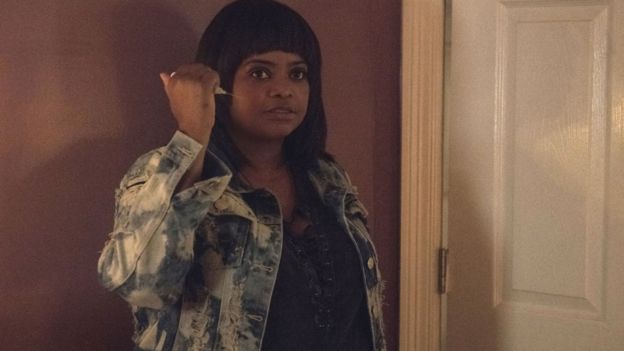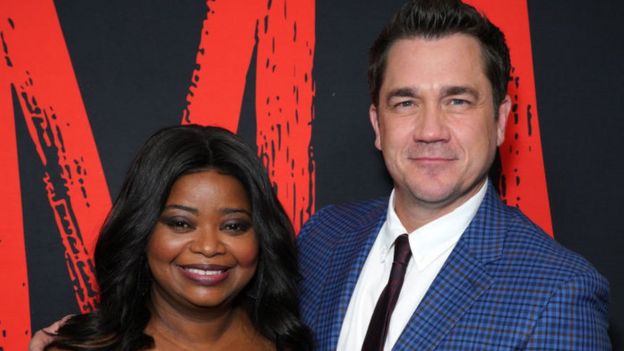|
The actress and producer makes her lead debut in psychological horror film MA, opening in cinemas this weekend. It sees her play Sue-Ann - a seemingly fun-loving veterinary assistant whose willingness to turn her basement into a teen party hotspot masks chilling intent. It's a sharp departure from a run of roles that have made her an award season staple - from an Oscar-win for 2011's The Help, to nominations for Hidden Figures in 2016 and The Shape of Water a year later. But the shift is purposeful. The three films, while making her one of only two black actresses to have received three Academy nominations, brought limitations. 
Image captionIn the film, Spencer plays a lonely veterinary aide struggling with social rejection
"So I thought, well, since I'm not doing anything that remotely resembles me anyway, I may as well go for gold and just do something completely out of that range at the other end of the spectrum." 'Complex' role Spencer says she "leapt at the chance" to star in the film, drawn to the complexity of Sue-Ann, in a film that balances varying extremes of popcorn dark humour with claustrophobic terror. Rebranding herself as "Ma" to a group of teenagers (fronted by Maggie, played by Glass actress Diana Silvers), she attempts to party "like a rockstar" - hard-drinking, kissing and dancing her way to approval. Beneath this shock-value of watching Spencer in such unfamiliar territory, the antics of the character she plays reflects a lonely figure, traumatised by a moment in her past. "There was no frame of reference," she says. 
Spencer is also an exec producer on the film
"When you first meet her, you don't want her to go down that road that you know that she's about to go down. And I just thought it was a very interesting character to play."
But the Alabama-born actress, 47, sees another, much broader significance to making MA her first lead project. As a young 20-something actress, fresh to Los Angeles after graduating from Auburn University, she struggled to break into Hollywood. In a profile with AARP, she recalled a moment as a production assistant on Joel Schumacher's courtroom drama A Time to Kill, that underlined her battle. Warning: Third party content may contain adverts Report "I wanted to be a woman who started this fight with the Ku Klux Klan, but Schumacher said, 'No, your face is too sweet for that. You can read for the nurse.' So I read for the nurse, and I got it". The curse of small, non-descript roles continued for 15 years. A look at her 133-credit filmography reveals she played the role of "nurse" 17 times prior to her breakthrough. Now, of course, the situation is different. And Spencer hopes that by fronting a horror film as a black woman - a rarity, even in 2019 - she can help smash limiting perceptions. 
Spencer with MA director Tate Taylor at the film's US premiere
"It's not just for me," she says, "but for the young girls who look like me, or little brown girls to have those opportunities, to be able to play the very fractured people and complex people."
Have these challenges made Spencer feel like an outsider? "Absolutely, at times" she replies. "I think every one of us, at some point in our lives, feels like an outsider, and that's what's relatable about Sue-Ann because we all know what it feels like. But then, she says, she "grew up and realised we all have our own paths. And sometimes they will intersect and sometimes they won't. But you have to be happy with who you are. "And it doesn't mean that you're an outsider, it just means you dance to your own drummer." |